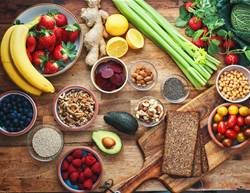Living in your gut are 100 trillion micro-organisms, mostly bacteria, and maintaining a good balance of these bacteria can have important knock-on benefits for your physical and mental health.
While we’re only just beginning to understand the complex role of gut health, it has already been linked to benefits for heart disease, type 2 diabetes, autoimmune diseases, skin conditions and even depression. A healthy gut has also been shown to have a positive impact on weight.
The latest research on grains and gut health shows carbs – specifically foods that are high in cereal fibre or whole grains – interact with the gut providing broad health benefits, including supporting weight management.
Time To Stop Cutting All Carbs
Whole grains contain a distinct combination of cereal fibres and potent antioxidants that are important for a healthy gut. Many of the cereal fibres and antioxidant compounds are unique to grains or found in much higher amounts than in any other plant-based foods.
So, it really is time to stop cutting all carbs and put the good ones back on the plate, including grain foods that are high in cereal fibre or whole grains.
They contain fibres that can be fermented by the gut - these are called MACs (microbiota-accessible-carbohydrates). Research shows MACs help the gut in two ways increasing the diversity and number of gut bacteria, while also providing the prebiotics to feed them. Win: win!
Go Mad For MACs
The fermentable fibres, or MACs, may also play a role in helping to control weight.
Several studies, on large groups of people, have shown those who have diets higher in fibre and whole grains tend to weigh less and are slimmer. This may be explained by what happens to whole grains in the gut.
When MACs are fermented by the gut bacteria, they are used by the body to create short chain fatty acids. (They help your body to regulate appetite and food intake.)
Eating whole grain and high cereal fibre foods, like breakfast cereals and grainy breads, will help to boost the MACs in your diet and increase short chain fatty acid production.
Bigger Benefits
There’s much more to MACs than helping manage weight. They help to increase absorption of some nutrients and inhibit the growth of many pathogens.
MACs are also carried by the insoluble fibres in whole grains through the length of the gut, slowing their fermentation and by doing so, ensuring the beneficial by-products are delivered where they are needed most, including to areas of the colon prone to cancerous changes.
At the same time the gut fermentation releases protective antioxidants bound to the insoluble fibres, delivering long-lasting protection both within the gut and throughout the body after absorption into the bloodstream.
These benefits complement the effects we see from fruit and veggies, and in some cases the antioxidant benefits of whole grains and cereal fibre lasts eight times longer.
How To Eat For A Healthy Gut
A healthy gut is one with a diverse and even mix of different bacteria. The good news is that changing what you eat is thought to be responsible for around 57% of the variation in the gut bacteria – a much bigger impact than genetics that only accounts for 12%.
That means there’s huge potential in using diet to improve gut health, whether for weight loss or other health goals.
Altering your diet to improve your gut health delivers quick results. A recent study found it only took three weeks of regularly eating a bowl of whole grain or high fibre breakfast cereal to see positive effects on gut bacteria and improve health.
Try these easy tips to eat for a healthy gut:
- Focus on a plant-rich diet, whether or not you choose to also eat meat.
- Include a diversity of plant foods to ensure a you get arrange of fibres.
- Choose foods high in wholegrains and cereal fibre daily.
- Include legumes at least two to three times a week.
- Try to eat a daily handful of nuts and/or seeds.
- Eat a variety of different vegetables and fruits each day.
Joanna McMillan is a Scottish-born Australian and one of the country’s favourite and most trusted health and nutrition experts. She is a PhD qualified nutrition scientist, Accredited Practising Dietitian, Adjunct Senior Research Fellow with La Trobe University and a Fellow of the Australasian Society of Lifestyle Medicine. She is a TEDx and international keynote speaker and MC and has authored seven books including Get Lean Stay Lean and her latest Brain Food.










